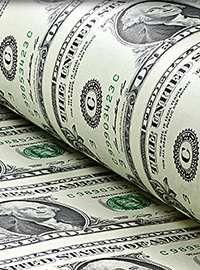| Supreme Court Confronts Unfair and Unconstitutional “Wealth Tax” |
 |
|
By Timothy H. Lee
Thursday, July 27 2023 |
In his desperate effort to rebrand “Bidenomics” as some sort of positive, Joe Biden regularly whispers into the microphone that he’s a deficit slasher. Nevermind that deficits only temporarily dipped because Covid spending expired, and that if Biden’s original “Build Back Better” had passed, spending and deficits would’ve been much higher. Whatever those realities, the federal deficit has nearly tripled in the first nine months of fiscal 2023: The Treasury Department said Thursday that the budget gap from October through June was nearly $1.4 trillion – a 170% increase from the same period a year earlier. The federal government operates under a fiscal year that begins October 1. The shortfall adds to an already large federal debt – estimated at more than $32 trillion. Financing that debt is increasingly expensive as a result of rising interest rates. Interest payments over the last nine months reached $652 billion – 25% more than during the same period a year ago. “Unfortunately, interest is now the government’s fastest growing quote-unquote ‘program,’” said Michael Peterson, CEO of the Peter G. Peterson foundation, which promotes fiscal responsibility. Accordingly, while Biden also likes to boast that inflation under his watch has decelerated from unbearable to merely painful, even that moderation came at the cost of higher interest rates, which in turn increase the deficit by inflating interest payments on the federal debt. With deficits set to increase sharply, the Biden Administration and spendthrift leftists consequently seek novel ways to fund their insatiable federal leviathan. Enter their proposal to impose a “wealth tax” on unrealized gains, attempting to turn a longtime aspiration into reality. “Unrealized gains” refer to increases in the value of assets that haven’t been sold or realized as profit. The idea refers most often to investments such as stocks, bonds or real estate, but almost any object of value such as art or antiques can also fall within its ambit. By taxing gains in value, the government would suddenly possess a new wellspring of revenue. In addition to being irrational and unworkable, however, the idea is unconstitutional. By hearing the case of Moore v. United States in its next term, the Supreme Court stands poised to reinforce that truth. In terms of legal merits, an income tax of any sort was unconstitutional until the 16th Amendment was ratified in 1913, and for generations the Supreme Court limited “income” to a gain that is “received or drawn by the recipient for his separate use, benefit and disposal.” It added for clarification, “Mere growth or increment of value in a capital investment is not income.” Nevertheless, it’s an idea that refuses to die. Beyond its constitutional deficiencies, however, a wealth tax on unrealized gains is indefensible on fairness and public policy grounds. First and foremost, the volatility of asset values creates glaring fairness risks. Few assets maintain a constant trajectory of ascent, particularly stocks and real estate. Consequently, citizens may be taxed on assets that later plummet in value, meaning a double loss. Should the government refund taxpayers who subsequently suffer such losses? Don’t hold your breath. Taxing unrealized gains also collides with the problem of illiquidity. Consider the hypothetical investor who is asset-rich but cash-poor, who doesn’t possess sufficient liquid funds to pay the tax. Should they be forced to sell the asset in order to pay taxes on it to the government, amounting to a forfeiture or taking? Third, consider the problem of assessing value of assets. While assets like stocks maintain a public price, many other types of assets do not until sold. Accordingly, there’s no readily available market value to accurately tax. Should a taxpayer be forced to list real estate or other possessions for sale just to ascertain some market value? And what about “assets” that holders do not intend to sell, such as family heirlooms? Taxing unrealized gains would also have the perverse effect of disincentivizing long-term investments. People like Joe Biden and Bernie Sanders constantly lambaste corporate leaders and other market participants for allegedly overemphasizing short-term gain, but their desire to tax “wealth” via unrealized gains would only fuel such behavior. In turn, that would increase market and economic volatility via needless and excess churn. Taxing unrealized gains creates myriad other threats, including the risk of deliberate market manipulation to distort prices and avoid taxation. Accordingly, the only fair method to tax income is to do so when it is actually realized via sale or exchange, at which point the asset holder actually gains “income.” And to the extent that Biden or Sanders worry about growing deficits and debt, the answer is to restrain spending, not seek new, unfair and unconstitutional ways to boost incoming revenues. Fortunately, as has often been the case recently, the Supreme Court stands ready to once again provide them the corrective that they’re unwilling to reach voluntarily. |
Related Articles : |
























